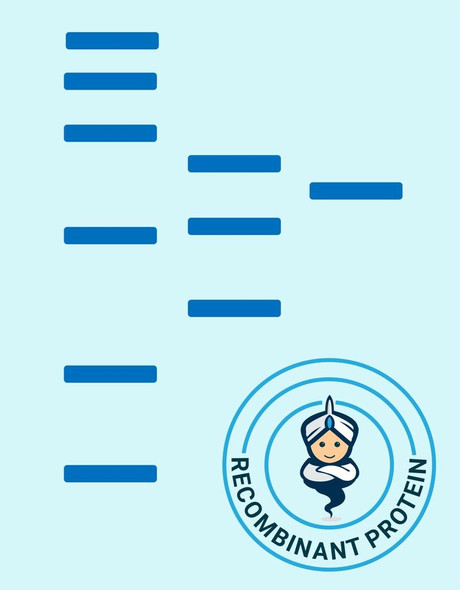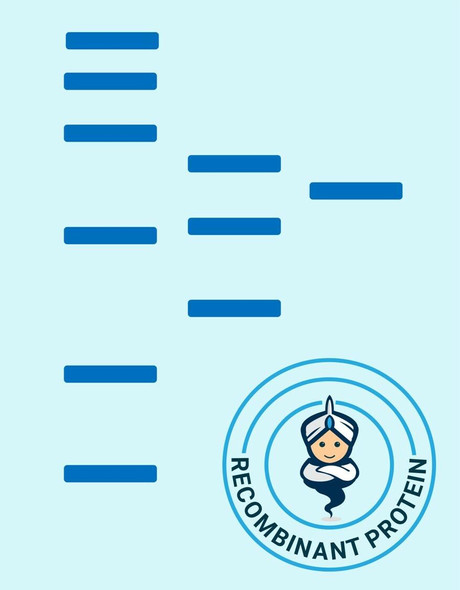Enzymes Recombinant Proteins
Human AUH Recombinant Protein (RPPB1429)
- SKU:
- RPPB1429
- Product Type:
- Recombinant Protein
- Species:
- Human
- Uniprot:
- Q13825
- Research Area:
- Enzymes
Description
| Product Name: | Human AUH Recombinant Protein |
| Product Code: | RPPB1429 |
| Size: | 20µg |
| Species: | Human |
| Target: | AUH |
| Synonyms: | Methylglutaconyl-CoA hydratase, mitochondrial, AU-specific RNA-binding enoyl-CoA hydratase, AU-binding protein/enoyl-CoA hydratase, AUH. |
| Source: | Escherichia Coli |
| Physical Appearance: | Sterile Filtered colorless solution. |
| Formulation: | The AUH solution (1 mg/ml) contains 20mM Tris-HCl buffer (pH8.0), 20% glycerol, 0.1M NaCl and 1mM DTT. |
| Stability: | Store at 4°C if entire vial will be used within 2-4 weeks. Store, frozen at -20°C for longer periods of time.�For long term storage it is recommended to add a carrier protein (0.1% HSA or BSA).Avoid multiple freeze-thaw cycles. |
| Purity: | Greater than 95.0% as determined by SDS-PAGE. |
| Amino Acid Sequence: | MGSSHHHHHH SSGLVPRGSH MSSEMKTEDE LRVRHLEEEN RGIVVLGINR AYGKNSLSKN LIKMLSKAVD ALKSDKKVRT IIIRSEVPGI FCAGADLKER AKMSSSEVGP FVSKIRAVIN DIANLPVPTI AAIDGLALGG GLELALACDI RVAASSAKMG LVETKLAIIP GGGGTQRLPR AIGMSLAKEL IFSARVLDGK EAKAVGLISH VLEQNQEGDA AYRKALDLAR EFLPQGPVAM RVAKLAINQG MEVDLVTGLA IEEACYAQTI PTKDRLEGLL AFKEKRPPRY KGE |
Mitochondrial methylglutaconyl-CoA hydratase (AUH) is involved in the amino acid degradation pathway by catalyzing the conversion of 3-methylglutaconyl-CoA to 3-hydroxy-3-methylglutaryl-CoA and water. AUH Human is expressed as a single mRNA species of 1.8 kb, and translated as a 40kDa precursor protein which is consequently processed to a 32kDa mature form. AUH has a very low enoyl-CoA hydratase activity. The AUH protein binds to the AU-rich element (ARE), which is a common element found in the 3' UTR of rapidly decaying mRNA such as c-fos, c-myc and granulocyte/ macrophage colony stimulating factor. AU-rich elements are involved in directing RNA to rapid degradation and deadenylation. In addition, AUH is homologous to enol-CoA hydratase, which is an enzyme involved in fatty acid degradation, and has been shown to have intrinsic hydratase enzymatic activity. AUH is therefore a bifunctional chimera between RNA binding and metabolic enzyme activity.
AUH Human Recombinant fused with a 21 amino acid His tag at N-terminus produced in E.Coli is a single, non-glycosylated, polypeptide chain containing 293 amino acids (68-339 a.a.) and having a molecular mass of 31.4kDa. The AUH is purified by proprietary chromatographic techniques.
| UniProt Protein Function: | AUH: Catalyzes the conversion of 3-methylglutaconyl-CoA to 3- hydroxy-3-methylglutaryl-CoA. Has very low enoyl-CoA hydratase activity. Was originally identified as RNA-binding protein that binds in vitro to clustered 5'-AUUUA-3' motifs. Defects in AUH are the cause of 3-methylglutaconic aciduria type 1 (MGA1). MGA1 is an inborn error of leucine metabolism. It leads to an autosomal recessive syndrome with variable clinical phenotype, ranging from delayed speech development to severe psychomotor retardation, coma, failure to thrive, metabolic acidosis and dystonia. MGA1 can be distinguished from other forms of MGA by the pattern of metabolite excretion: 3- methylglutaconic acid levels are higher than those detected in other forms, whereas methylglutaric acid levels are usually only slightly elevated, and there is a high level of 3- hydroxyisovaleric acid excretion (not present in other MGA forms). Belongs to the enoyl-CoA hydratase/isomerase family. 2 isoforms of the human protein are produced by alternative splicing. |
| UniProt Protein Details: | Protein type:Mitochondrial; Lyase; Amino Acid Metabolism - valine, leucine and isoleucine degradation; EC 4.2.1.18; RNA-binding Chromosomal Location of Human Ortholog: 9q22.31 Cellular Component: mitochondrion; mitochondrial matrix Molecular Function:methylglutaconyl-CoA hydratase activity; mRNA 3'-UTR binding; enoyl-CoA hydratase activity Biological Process: leucine catabolic process; branched chain family amino acid catabolic process Disease: 3-methylglutaconic Aciduria, Type I |
| NCBI Summary: | This gene encodes bifunctional mitochondrial protein that has both RNA-binding and hydratase activities. The encoded protein is a methylglutaconyl-CoA hydratase that catalyzes the hydration of 3-methylglutaconyl-CoA to 3-hydroxy-3-methyl-glutaryl-CoA, a critical step in the leucine degradation pathway. This protein also binds AU-rich elements (AREs) found in the 3' UTRs of rapidly decaying mRNAs including c-fos, c-myc and granulocyte/ macrophage colony stimulating factor. ARE elements are involved in directing RNA to rapid degradation and deadenylation. This protein is localizes to the mitochondrial matrix and the inner mitochondrial membrane and may be involved in mitochondrial protein synthesis. Mutations in this gene are the cause of 3-methylglutaconic aciduria, type I. Alternative splicing results in multiple transcript variants. [provided by RefSeq, Sep 2015] |
| UniProt Code: | Q13825 |
| NCBI GenInfo Identifier: | 37076898 |
| NCBI Gene ID: | 549 |
| NCBI Accession: | Q13825.1 |
| UniProt Related Accession: | Q13825 |
| Molecular Weight: | 37kDa |
| NCBI Full Name: | Methylglutaconyl-CoA hydratase, mitochondrial |
| NCBI Synonym Full Names: | AU RNA binding methylglutaconyl-CoA hydratase |
| NCBI Official Symbol: | AUH�� |
| NCBI Protein Information: | methylglutaconyl-CoA hydratase, mitochondrial |
| UniProt Protein Name: | Methylglutaconyl-CoA hydratase, mitochondrial |
| UniProt Synonym Protein Names: | AU-specific RNA-binding enoyl-CoA hydratase; AU-binding protein/enoyl-CoA hydratase |
| Protein Family: | Methylglutaconyl-CoA hydratase |
| UniProt Gene Name: | AUH�� |
| UniProt Entry Name: | AUHM_HUMAN |






